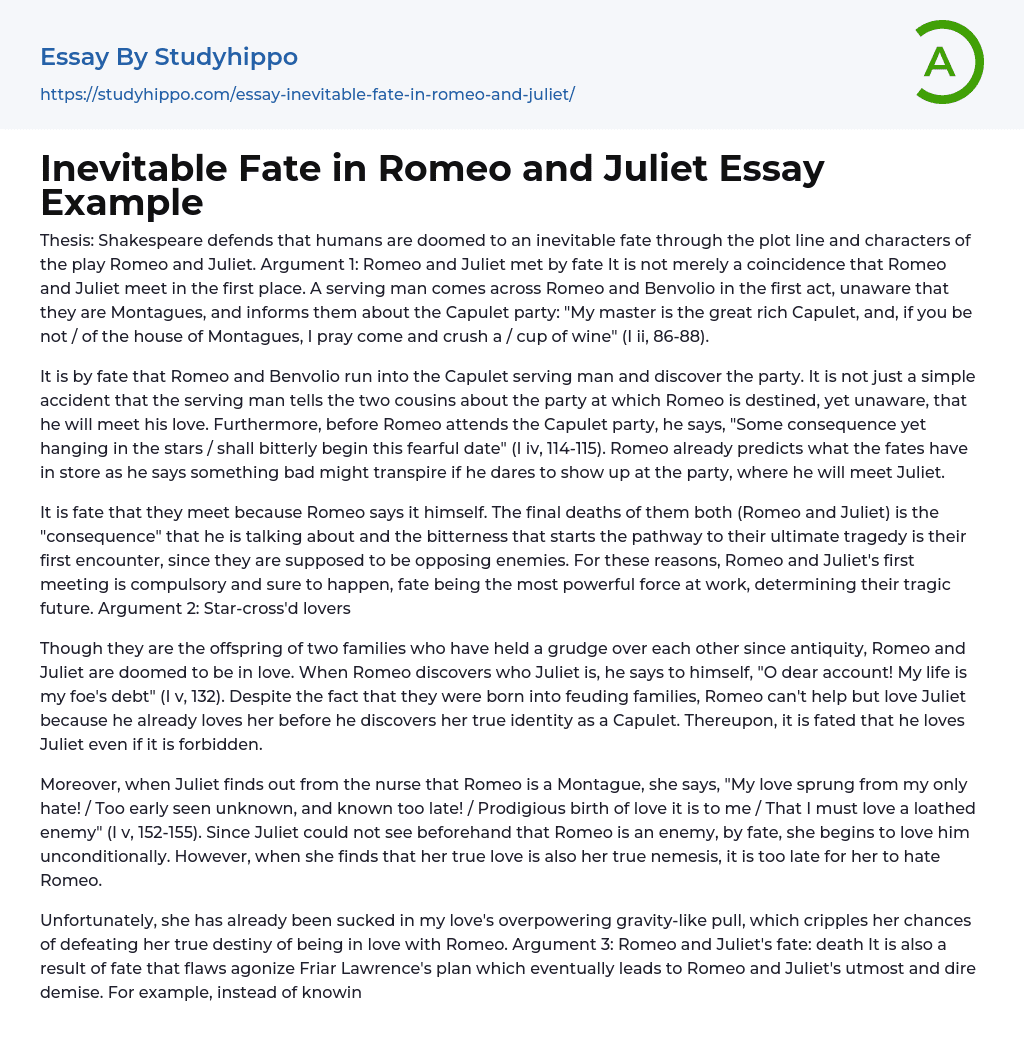Thesis: Shakespeare defends that humans are doomed to an inevitable fate through the plot line and characters of the play Romeo and Juliet. Argument 1: Romeo and Juliet met by fate It is not merely a coincidence that Romeo and Juliet meet in the first place. A serving man comes across Romeo and Benvolio in the first act, unaware that they are Montagues, and informs them about the Capulet party: "My master is the great rich Capulet, and, if you be not / of the house of Montagues, I pray come and crush a / cup of wine" (I ii, 86-88).
It is by fate that Romeo and Benvolio run into the Capulet serving man and discover the party. It is not just a simple accident that the serving man tells the two cousins about the party at whic
...h Romeo is destined, yet unaware, that he will meet his love. Furthermore, before Romeo attends the Capulet party, he says, "Some consequence yet hanging in the stars / shall bitterly begin this fearful date" (I iv, 114-115). Romeo already predicts what the fates have in store as he says something bad might transpire if he dares to show up at the party, where he will meet Juliet.
It is fate that they meet because Romeo says it himself. The final deaths of them both (Romeo and Juliet) is the "consequence" that he is talking about and the bitterness that starts the pathway to their ultimate tragedy is their first encounter, since they are supposed to be opposing enemies. For these reasons, Romeo and Juliet's first meeting is compulsory and sure to happen,
fate being the most powerful force at work, determining their tragic future. Argument 2: Star-cross'd lovers
Though they are the offspring of two families who have held a grudge over each other since antiquity, Romeo and Juliet are doomed to be in love. When Romeo discovers who Juliet is, he says to himself, "O dear account! My life is my foe's debt" (I v, 132). Despite the fact that they were born into feuding families, Romeo can't help but love Juliet because he already loves her before he discovers her true identity as a Capulet. Thereupon, it is fated that he loves Juliet even if it is forbidden.
Moreover, when Juliet finds out from the nurse that Romeo is a Montague, she says, "My love sprung from my only hate! / Too early seen unknown, and known too late! / Prodigious birth of love it is to me / That I must love a loathed enemy" (I v, 152-155). Since Juliet could not see beforehand that Romeo is an enemy, by fate, she begins to love him unconditionally. However, when she finds that her true love is also her true nemesis, it is too late for her to hate Romeo.
Unfortunately, she has already been sucked in my love's overpowering gravity-like pull, which cripples her chances of defeating her true destiny of being in love with Romeo. Argument 3: Romeo and Juliet's fate: death It is also a result of fate that flaws agonize Friar Lawrence's plan which eventually leads to Romeo and Juliet's utmost and dire demise. For example, instead of knowing about what the friar has in mind, Romeo is
informed by Balthasar about Juliet's "death": "Her body sleeps in Capel's monument, / And her immortal part with angels lives" (V I, 19-20).
Though it seems like an honest accident that Balthasar is the one to tell Romeo about the turn of events, it is more likely that fate holds a much greater influence. By fate, Balthasar comes to Romeo and tells him what he believes to be true, but the piece of information he offers is a cause of the tragedy. Friar Lawrence's plan is also ruined because Friar John is unable to deliver the message to Romeo: "I could not send it (here it is again) / Nor get a messenger to bring it thee, / So fearful were they of infection" (V iii, 14-16).
Because Friar Lawrence's message is crucial to the plan he devises, the fact that it is never sent creates a major rupture that can turn out to be quite deadly. Romeo, not knowing that Juliet isn't officially dead, makes a big mistake, because he is oblivious, that leads himself and Juliet toward their impending doom. The fate put over the friar's plan leaves Romeo a desire to die, which destines Juliet and himself to their conclusive fate: death.
- Mercutio essays
- 1984 essays
- A Farewell to Arms essays
- A Good Man Is Hard to Find essays
- A Hanging essays
- A Lesson Before Dying essays
- A Long Way Gone essays
- A Rose For Emily essays
- A Separate Peace essays
- A Tale Of Two Cities essays
- A Very Old Man With Enormous Wings essays
- Adventures Of Huckleberry Finn essays
- Alice in Wonderland essays
- All Quiet on The Western Front essays
- Allegory of the Cave essays
- An occurrence at owl creek bridge essays
- Animal Farm essays
- Anthem essays
- Antigone essays
- Arthur Conan Doyle essays
- As I Lay Dying essays
- Atticus Finch essays
- Barn Burning essays
- Battle Royal essays
- Beauty and The Beast essays
- Beloved essays
- Boo Radley essays
- Brave New World essays
- Candide essays
- Castle essays
- Characters In Hamlet essays
- Characters In Romeo And Juliet essays
- Christmas carol essays
- Chronicle of a Death Foretold essays
- Cinderella essays
- Crime and Punishment essays
- Daisy Miller essays
- Death of a Salesman American Dream essays
- Desdemona essays
- Diary Of A Wimpy Kid essays
- Dracula essays
- Dubliners essays
- Emma essays
- Ender'S Game essays
- Ethan Frome essays
- Eveline essays
- Fahrenheit 451 essays
- First-Person Narrative essays
- Fish Cheeks essays
- Frankenstein essays




